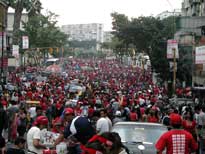
Marc Becker
The Monitor
August 30, 2004
Caracas, Venezuela woke up early on Sunday, August 15 to the sounds of bugle calls, fireworks, car horns, music, and slogans with activists rallying the public to participate in a presidential referendum. By 5 a.m., voters were already queuing up at polling stations to decide whether or not to recall Hugo Chavez, the South American country’s charismatic and controversial president.
A record number of people voted in the referendum. Some people waited up to thirteen hours to vote, and the polls that were initially to close at 6 p.m. were held open until midnight. At 4 a.m. on Monday morning, fireworks and shouts on the streets made it clear that Chavez had won an overwhelming victory. In a pouring rain, his supporters converged on the presidential palace to celebrate. The festivities continued through Monday night, with caravans of cars and trucks loaded with people waving flags and honking their horns parading through the streets of Caracas.
Venezuela is the world’s fifth largest oil exporting country, and the largest producer in the Americas. These oil revenues previously only benefitted a small elite class. Chavez, however, began to use these resources to fund social legislation designed to attack endemic poverty. Government priorities that emphasize education, health care, and nutrition have provided the lower class with a sense of hope and optimism.
Chavez policies have alienated Venezuela’s traditional ruling elite. In contrast to previous political leaders who have always come from the white upper class, Chavez is an outsider who is proud of his Indigenous and African roots. He appeals to those who feel as if they never before have had anyone in power who understood their needs or represented their interests. For these disenfranchised and marginalized people, he is their champion, and they are willing to defend him to the death.
From their privileged gated communities, the opposition could not believe and would not accept that Venezuelans would vote 58 to 42 percent to keep the president. When the electoral commission declared Chavez to be the winner, the opposition cried fraud. They called on international observer missions to denounce the results. Instead, the Organization of American States (OAS) and the Carter Center declared the election to be the most clean, transparent, and accurate in the country’s history.
The Carter Center’s certification of Chavez’s victory is rather ironic given that through the National Endowment for Democracy (NED), the U.S. government helped fund the opposition in their recall effort. Chavez has stridently condemned U.S. imperialism and neoliberal economic polices, and is one of the most significant blockages to Bush administration plans to implement the Free Trade Area of the Americas (FTAA) by 2005. With the Iraq situation out of control and oil prices rising to unprecedented levels, however, the U.S. government appears to prefer a Chavez administration to the continuing political instability that the right-wing opposition represents.
Maria Egilda Castellano of the Universidad Bolivariana de Venezuela (UBV) notes that “Chavez is just a leader, but it is the process that is more important.” Venezuela is building a new form of “participatory protagonistic democracy” in which people have a real voice in the political process. It is replacing a “representative democracy” that has entrenched wealth and power in the hands of a ruling elite. Chavez’s defeat would not have represented so much the loss of a popular leader as it would be the loss of social programs and a government that listens to and cares about the people.
If the Chavez government is to be evaluated according to the biblical standard of how it treats “the least of these my brethren,” it indeed is an experiment to be supported. His victory provides an opportunity to build broader participation and deepen the political process of creating a more humane, more just, and more internationalist culture. The defeat of the recall referendum was not only a victory for one man or even for a country, but it is a victory for all who desire a more peaceful and just social order.
